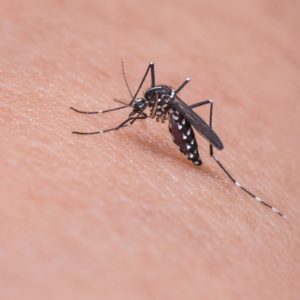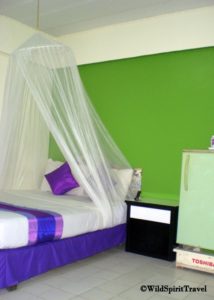 Worried about being attacked by a lion or shark when traveling the world? Those things happen, but rarely. Really not worth losing sleep over. The animal you should worry about is the MOSQUITO. The World Health Organization estimates that 725,000 people are killed each year by mosquito borne diseases. This makes them the most dangerous animal on the planet.
Worried about being attacked by a lion or shark when traveling the world? Those things happen, but rarely. Really not worth losing sleep over. The animal you should worry about is the MOSQUITO. The World Health Organization estimates that 725,000 people are killed each year by mosquito borne diseases. This makes them the most dangerous animal on the planet.
Mosquitoes are pesky flying annoyances. They transmit malaria, dengue, Japanese encephalitis, West Nile virus, yellow fever and other serious diseases. I had dengue fever in Thailand, and I can assure you it was not fun. There are vaccines for a few of these (details at Centers for Disease Control www.cdc.gov/travel) but not all. So when traveling, it is simply best not to have a mosquito suck your blood. Here are the four things I started doing after recovering from dengue in order to avoid further bites.
(1) Use a Mosquito Repellent
Perhaps the best mosquito deterrent is DEET-based repellents. Although, when I am traveling the world on an extended trip, I hate the idea of using DEET every day all day. And in many areas of the world you do need protection all day as dengue mosquitoes bite both night and day. So simply spraying yourself with repellent at sunset is not enough coverage worldwide.
Keep in mind, that a high DEET concentration does not mean a higher mosquito deterrent. A spray with a high DEET % means you do not have to reapply it as often. So for me, I prefer a lower DEET concentration on my skin, even if it means reapplying throughout the day. And this is what I have been able to find when traveling the world. In various countries around the world I have purchased 30% DEET repellents either as a spray or a cream.
Better yet, are natural sprays. Many people like citronella based sprays, but these may or may not work. The United States Environmental Protection Agency classifies citronella as a bio-pesticide, but the EU has banned it from being classified as an insect repellent as their tests did not prove effectiveness.
 Recently we have started using Repel Lemon Eucalyptus, 30%, spray. It uses oil of lemon eucalyptus which is extracted from the gum eucalyptus tree of Australia. We are not the only ones that thinks this works. According to an article from Consumer Reports (Do ‘Natural Insect Repellents Work?) “Repel Lemon Eucalyptus, 30%, warded off mosquitoes for more than 6.5 hours.” With confirmation like that, I am going to continue to travel with this.
Recently we have started using Repel Lemon Eucalyptus, 30%, spray. It uses oil of lemon eucalyptus which is extracted from the gum eucalyptus tree of Australia. We are not the only ones that thinks this works. According to an article from Consumer Reports (Do ‘Natural Insect Repellents Work?) “Repel Lemon Eucalyptus, 30%, warded off mosquitoes for more than 6.5 hours.” With confirmation like that, I am going to continue to travel with this.
Please use only as directed and note the Centers for Disease Control and Prevention advises against using OLE-based repellents on children under 3.
(2) Cover Up
Less exposed skin often equates to less mosquito bites. Therefore, I travel with a light-weight cover shirt that I can wear even when it is hot. I also travel with convertible safari trousers. When it is hot, I wear them as shorts, unless there are mosquitoes around. Then I zip on the bottoms and cover my legs. Mosquitoes especially like to bite human extremities so feet, ankles and calves are great targets. If I am in a mosquito danger area, I cover up so they can’t get my legs, plus I wear socks too.
Mosquitoes can bite through clothing, especially very thin items, so don’t go too shear. Also, mosquitoes are attracted to dark colors. That means, light colored clothes are better. Some of my favorite travel clothes comes from Eddie Bauer, including light colored cover shirts. (www.EddieBauer.com)
(3) Sleep Under a Mosquito Net
When I travel to a malarial area, I pack a mosquito net. It is heavy and bulky. Nevertheless, I consider it essential when traveling to parts of the world that have malaria or dengue fever. To find out countries with mosquitoes passing on these diseases go to the Centers for Disease Control website.
Before embarking to remote locations, practice putting up your mosquito net. It may require screwing a hook into the ceiling of where you are staying. Believe it or not, this is usually not a problem. If you are in a 5-star hotel in an area where mosquito nets are recommended then usually your room will have air-con and mosquitoes don’t like air-con. But if you are staying in budget accommodation then you will often find numerous hook holes already in the ceiling, we always did.
 Also, many hotels and budget accommodation options provide mosquito nets already hooked up. In which case you do not need to hang your own. Just do a good inspection and make sure there are no holes. If you find one, use your emergency sewing kit (every world traveler should pack one) to close it up. When you go to bed, make sure you tuck the net in securely all around your bed. All it takes is one opening to let in unwanted mosquitoes.
Also, many hotels and budget accommodation options provide mosquito nets already hooked up. In which case you do not need to hang your own. Just do a good inspection and make sure there are no holes. If you find one, use your emergency sewing kit (every world traveler should pack one) to close it up. When you go to bed, make sure you tuck the net in securely all around your bed. All it takes is one opening to let in unwanted mosquitoes.
In addition to not liking air-con, mosquitoes tend not to like high powered fans; it is too much motion for them. So running a fan, if there is one in your room, is helpful. Just make sure it does not blow your mosquito net too much.
(4) Burn a Mosquito Coil
When living in Thailand, I became accustomed to restaurants lighting a mosquito coil and setting them under tables. I finally decided to do like the locals and started buying my own. I have set them next to me at restaurants, burned them in hotel rooms, and enjoyed them while sitting on a deck in the evening.
Around the world, mosquito coils tend to be inexpensive and readily available. They also pack flat and are easy to take from destination to destination. Just be careful with where you set them. If in your hotel room, be sure there is nothing near it that could catch fire. Also make sure it is not in your path from the bed to the bathroom. I learned that one the hard way one dark night.
{This blog was written by a world traveler, not a doctor. Please consult a travel clinic / doctor for the latest news on protection & vaccinations against mosquito borne illnesses.}
#travelsmart #traveltips #worldtravel #travelhealth
By Shyla Esko Bare, August 2015, updated January 2020. Travel Smart Strategies ©WildSpiritTravel
